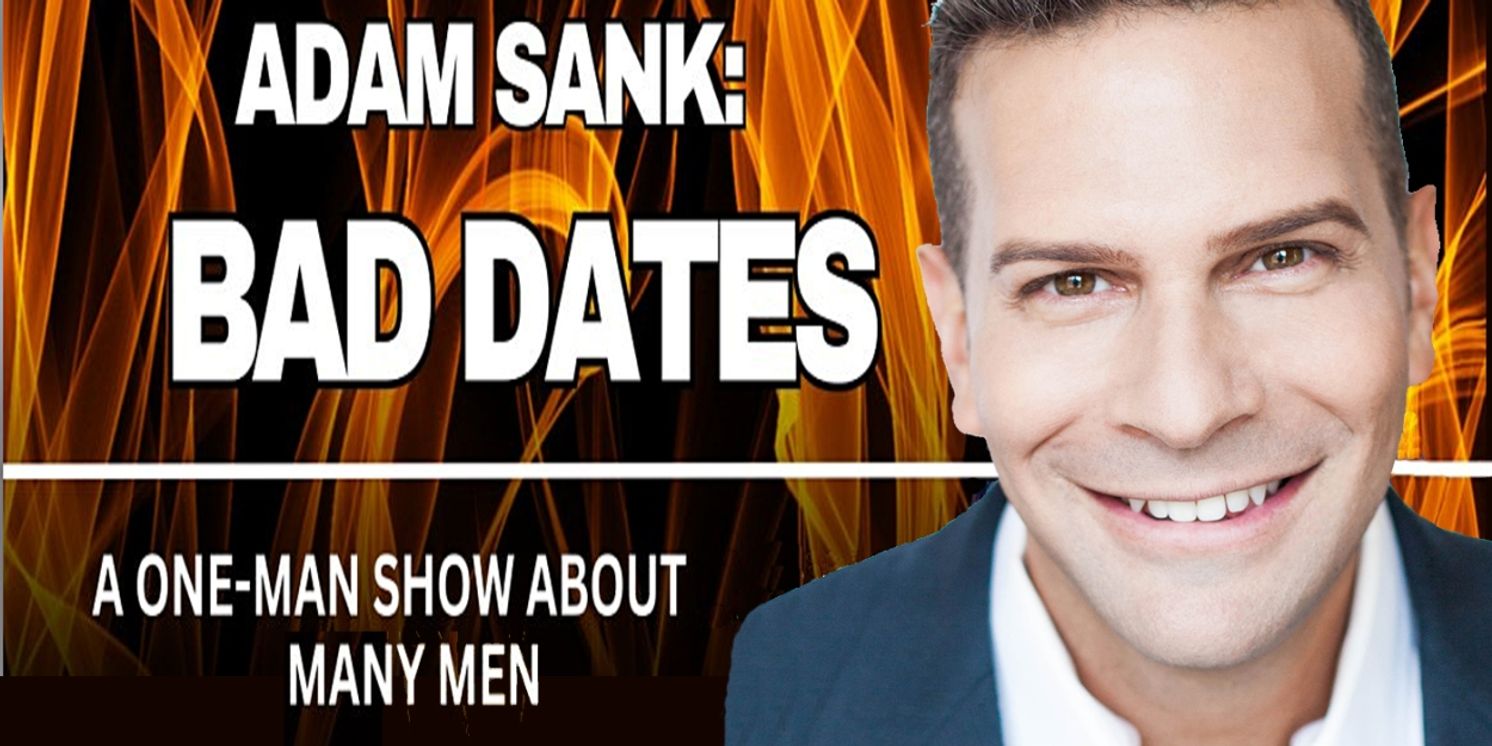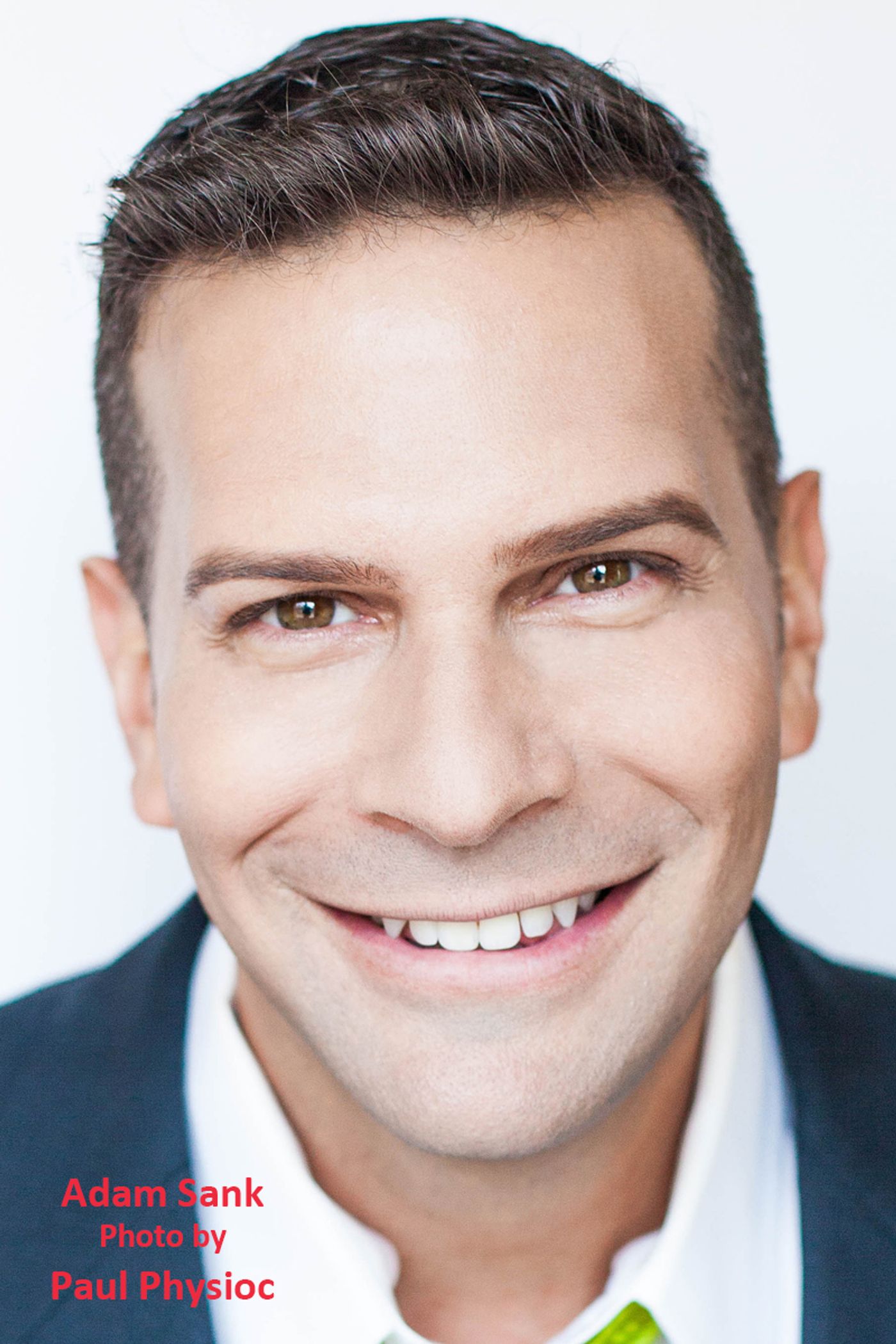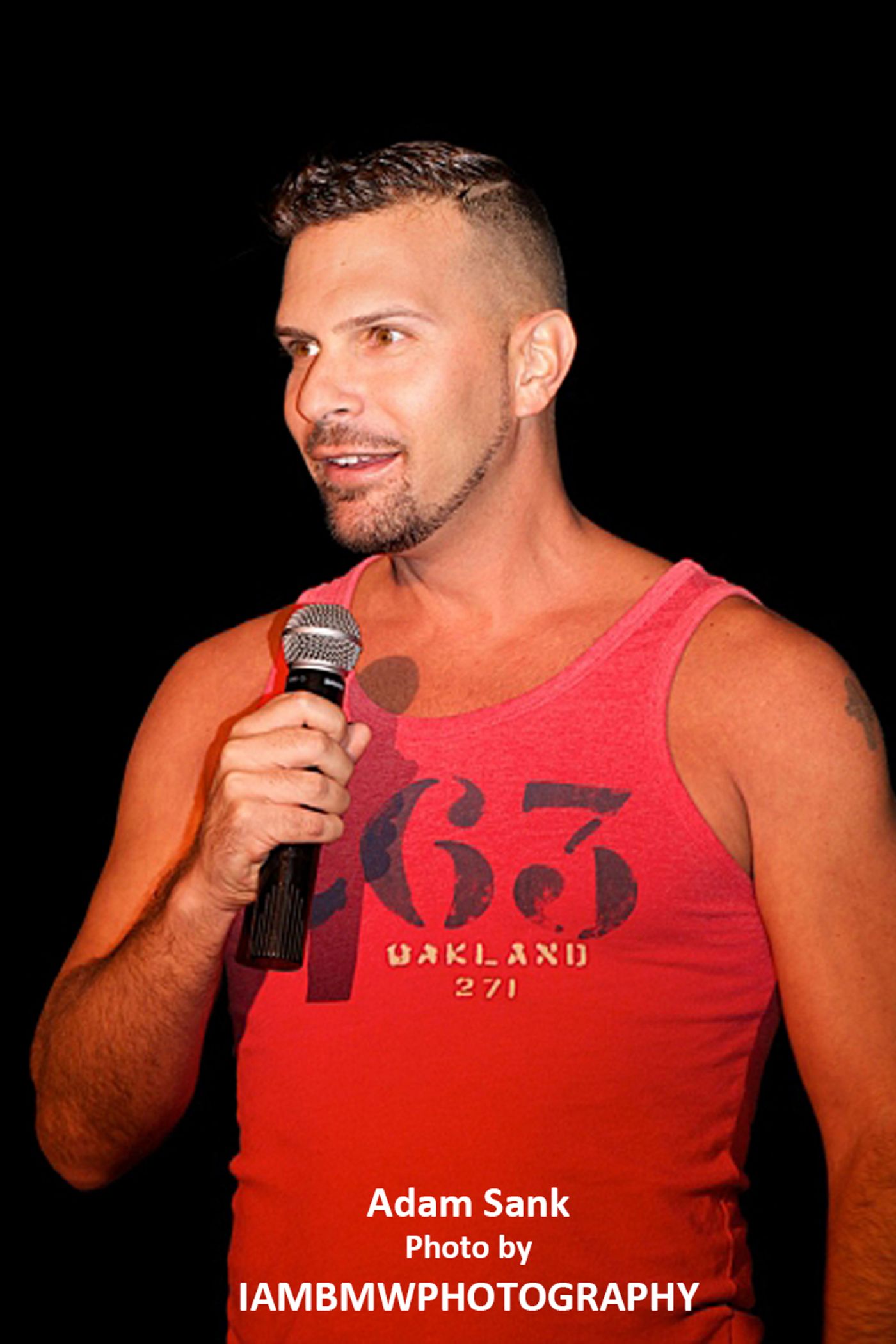Interview: Adam Sank Revels in His BAD DATES: A ONE-MAN SHOW ABOUT MANY MEN
Comedian Adam Sank Los Angeles premieres his acclaimed one-man show, Bad Dates: A One Man Show About Many Men, @ the Broadwater Main Stage December 6th


Comedian Adam Sank Los Angeles premieres his acclaimed one-man show, Bad Dates: A One Man Show About Many Men, at the Broadwater Main Stage for one-night-only on December 6, 2024. Adam actually came out of retirement to share his bad, but hilarious dating experiences.
Thank you for taking the time for this interview, Adam!
As a comedian, how set in stone are your sets?
Oh, I plan everything out ahead of time. I come from a TV news background, so I'm always thinking like a producer, where you have to plan every second that you're on the air: This is how we'll begin, then this will happen, then this will happen, and so forth. I've done sets where I just tried to "wing it," and they haven't gone well. I'm too much of a control freak to be spontaneous. That said, when you're in front of an audience, you have to be able to react to whatever's happening in the room. If they feel like you're just sticking to a script, you'll lose them. So I go in prepared but also ready for any surprises that come my way.
Bad Dates originally premiered at New York’s Stonewall Inn in the summer of 2023. It has then ran for two sold-out weeks at the Foundry in Wilton Manors, Florida and two sold-out nights at Oscar’s Palm springs in January of this year. Audiences who have seen all these shows would not have seen the same exact show, right? You gauge the temperature of the audience to get the ultimate response.
With standup, your jokes evolve over time. The more you perform a bit, the more you think of a new tag or a funnier phrase, or you cut one line that never gets a good laugh. "Bad Dates" is somewhat different because it's a one-man show – the first one I've ever done. The stories I tell in it build to a climax and then a resolution. So the beginning and ending have stayed pretty much the same ever since my first performance at Stonewall. But originally, the show was only 60 minutes long. When I brought it to Wilton Manors and did it over and over again for two weeks, I kept thinking of new lines and even a new story that I hadn't originally included. By my final performance down there, the show had grown to 90 minutes. And that's kind of where I've frozen it. I do have the freedom to change it up a bit every time I do it, though. That's the fun part about doing a one-man-show that I wrote myself. Nobody knows if I forget something or get a line wrong.
When do you decide to include your dirty jokes?
I guess it depends on what your definition of "dirty" is. My comedy idol is Howard Stern; I've been listening to him since I was 14. Howard always asks, "Why is talking about sex 'dirty?'" And I feel the same. We all talk about sex all the time. It's part of the human experience. So, with an adult crowd in a comedy club – especially a crowd of gay men – yeah, I tell some jokes that involve graphic sex. But I'd like to think the jokes are funny because they're smart, and they point out some universal truths – not because their dirty. But to answer your original question, I'm a people-pleaser when it comes to comedy. If I'm doing a corporate event, and they ask me to be squeaky-clean and not use any profanity, that's exactly what I'll give them. Last year I performed for an organization that supports LGBTQ Orthodox Jews, if you can imagine. They were very clear with me that my set had to be clean. I was, and it went great. (Although I did close with a classic bit about a dead guy with a huge dick. But I told it in a "clean" way. You can watch the whole set here.)
Will there be a lot of dirty jokes in Bad Dates?
It's a show about all of the relationships, dates and hookups that have ended disastrously for me, so of course that includes some sex stories. And some of them are rather graphic. But as I said before, being dirty or shocking is not the goal. Anything dirty is used merely to set up the story. For me, it's the punchline and the tag that matters, and those are never dirty; they're about some human foible – usually my own.
I'll give you an example. This joke is not in Bad Dates; it's on my second comedy album. I have a bit about how a gay friend of mine got drunk with his straight father and wound up blowing him. I should make clear that this happened when my friend was an adult. This joke is probably the edgiest and most shocking thing I've ever said onstage. (It also happens to be a true story.) The joke has a couple different punchlines, but my favorite part is when I say, "When my friend told me this, I did what any normal, sane person would do: I went on Facebook immediately to see what his father looks like."
Because that's what we'd all do, right? I mean, yes, we'd be shocked and revolted, but a small part of us would also wonder, "How hot could this 60-something father be that his own son would want to blow him?" It's that contradictory impulse that I find so funny. (You can listen to the joke here.)
What would your three-line pitch for Bad Dates be?
"A 50-something gay man looks back on a lifetime of looking for love in all the wrong places, with all the wrong people. It's hilariously funny... until it's not." (I guess I only needed two lines.)
Is there a director credited for Bad Dates? Or do you direct yourself?
When I went down to do the show at the Foundry, in Wilton Manors, the theater's artistic director, Ronnie Larsen, directed the production. He had a complete vision for it, including a full stage set. He kept telling me, "This isn't a comedy show; it's a play. And you're an actor." I fought him tooth and nail, because I don't consider myself an actor – certainly not a trained one – and I was terrified of doing all the physical stuff he wanted me to do. But in the end, he was right. His direction added so many new elements to the show, and it's one of the reasons the piece grew by another 30 minutes while I was doing that run. Now, I haven't done it with a set since then, so I can't do everything he came up with. But I still use some of the physical bits he added. I definitely give him a lot of credit for helping me develop the material. But otherwise, no, I am my own director for this show when I do it anywhere else.
 You retired from stand-up in 2019 after 15 years on the stage. You returned to the stage in 2023 with Bad Dates. Would you say your four years of retirement was rejuvenating for your performing juices?
You retired from stand-up in 2019 after 15 years on the stage. You returned to the stage in 2023 with Bad Dates. Would you say your four years of retirement was rejuvenating for your performing juices?
Yes and no. I quit stand-up because it no longer felt creatively fulfilling. It began to feel like I was a magician performing the same trick over and over again. Yes, I might write new jokes, but each joke felt like the same trick: Lay out a premise, build pressure, hit the punchline, relieve the pressure, add a tag or two to reinforce how clever I am, and so forth. It felt empty. So I quit, and during those years, I only took corporate gigs – which really aren't standup engagements so much as hosting gigs – because the money was too good to give up. Or I would take a gig if it meant I got to have a paid vacation somewhere cool. But I stopped doing comedy clubs altogether. And I didn't miss that at all.
Then, Ronnie Larsen reached out to me in March of 2023. He had booked me to do stand-up at the Foundry a couple times in the past, and he said, "I want you to do an hour down here in November. It can be anything you want." And somehow, the idea of doing an entire show about all the bad dates and relationships I've ever had popped into my head. At first, I was just going to compile all this old material I had. And then I thought like, "Blech." Because I'm so bored by my old stuff. But then it occurred to me: what if I included the worst dating story of my life – one that's the opposite of funny? Could I do that? And if I did, how could I figure out a way to drop this bomb on the audience after making them laugh for an hour? And what happens after I do? How do I wrap everything up and create some kind of takeaway for the audience? And the show just kind of took shape in my mind.
Once I started trying it out at Stonewall – and the audience reaction was so overwhelmingly positive – I realized that this is what I'm supposed to be doing. Not just jokes for the sake of jokes, but storytelling that makes a point. It's more satisfying than anything I've ever done onstage.
What did you want to be growing up? A comedian? An actor? An accountant?
From the age of six, I wanted to be on Broadway. I was obsessed with musical theater – still am – and spent countless hours of my childhood listening to the original cast albums of West Side Story, Pippin, A Chorus Line, Evita, Sweeney Todd.
I was in a dozen local and school musicals between the ages of 8 and 18, and I did a few in college too. I was always incredibly comfortable on a stage. But stupidly, I never got any training as an actor or singer. So when I graduated college, my performing life ended suddenly. And it wasn't until I was 32 that I got back onstage... as a comedian.
When you started out in the comedy clubs in 2003, was being an out gay comedian easy?
My generation of out LGBTQ comedians wasn't the first. Jim David, Kate Clinton, Suzanne Westenhoefer and the late, great Bob Smith were the original trailblazers, among others. But it was still something of a novelty to be openly queer onstage in 2003. In the beginning, I loved performing for straight crowds, because they were so easily entertained by the fact that I was gay. I confess, my early material was kind of minstrelsy: "In nursery school, we had a costume closet, and the costume I always chose was the wedding gown!" That sort of thing. But when I performed for gay crowds, I quickly learned that that stuff wouldn't fly with them. They were like, "Yeah, you're gay. We're all gay. Now make us laugh, asshole." Hosting a weekly show for a gay crowd at Therapy Lounge (RIP) in New York for three years made me a much better comedian.
When did you see the attitude towards gay comedians become more mainstream?
I mean, definitely in the last ten years, there's been a huge shift. I think "identity comedy" in general has become passé. What I mean by that is, when I started out, queer comedians would mostly talk about being queer onstage. Black comedians would talk about being Black. Fat comedians made fat jokes about themselves. Think about someone like Carlos Mencia, whose whole act was about being Mexican (even though he's actually Honduran). I feel like audiences have evolved past that now, and comedians have too. Nowadays, most audiences don't care that you're gay or trans or a person of color or whatever. They just want you to be funny, to have an original point of view. It's also no longer seen as cool for oppressed communities to punch ourselves in the face for laughs. Hannah Gadsby has a great line about that in her Nanette special: "I have built a career out of self-deprecating humor, and I don’t want to do that anymore. Because do you understand what self-deprecation means when it comes from somebody who already exists in the margins? It’s not humility. It’s humiliation."
I have done the Los Angeles AIDSWALK before and raised a couple of thousand. How did you personally raise over $95K for AIDS Walk NY?
For seven years, I was a member of the New York City Gay Men's Chorus. They made me the captain of our AIDS Walk team each year, so I felt this pressure to raise the most of anyone, you know? So, I would just post multiple fundraising solicitations on my social media each year, and I guess I just have a lot of very generous friends and followers. People from high school whom I wasn't even close to were donating $250 here, $500 there. It was really amazing.
What inspired you to be a licensed wedding officiant in New York?
My oldest friend in the world, Amy Slotnick, was getting married, and she asked me to be the officiant. She and her groom, Noah, wanted a light, fun ceremony performed by someone who knew them. I said yes immediately, and I had a blast. Since then, I've performed about six other ceremonies. It's really special to play a part in the most important day in most people's lives.
Will you be revamping your podcasts in the near future?
I wish! I loved doing the podcast, but it was so much work. All 265 episodes are still available to listeners. And my co-host, Steve Chazaro, and I still do bonus episodes once or twice a year. But I can't see ever going back to doing it weekly, unless someone wants to pay me a lot of money to do it.
What else does Adam Sank have planned for his future?
For the moment, keep bringing Bad Dates to new audiences and new cities. Ultimately, I'm going to need to write a new show. Let me know if you have any ideas.
Thank you again, Adam! I look forward to experiencing your Bad Dates.
For Bad Date tickets December 6, 2024; click on the button below:
Videos

